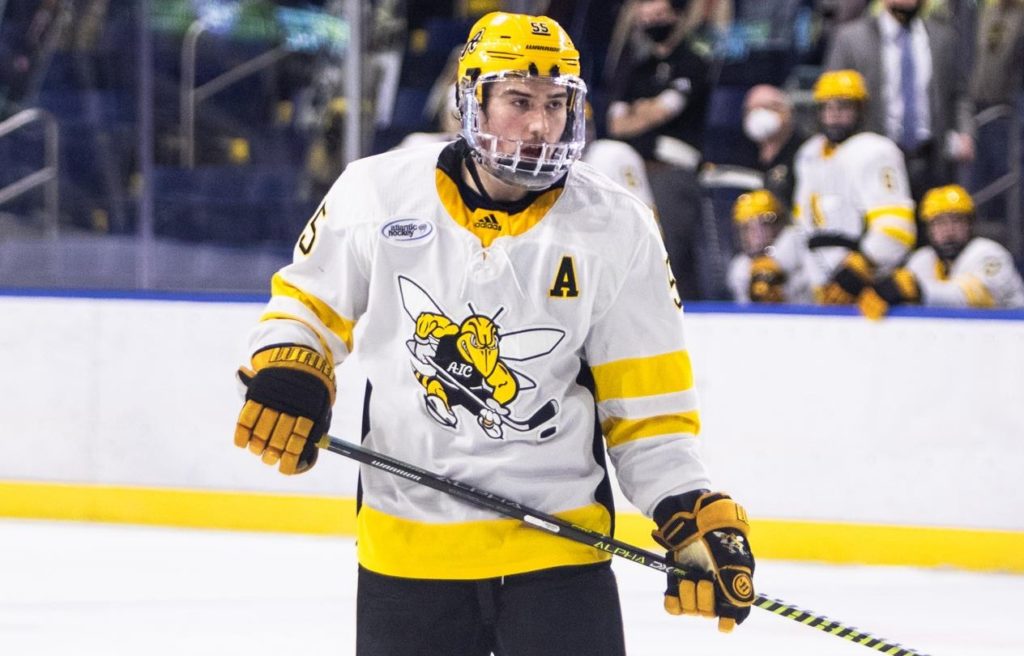
Each week during the season, we look at the big events and big games around Division I men’s college hockey in Tuesday Morning Quarterback.
Paula: Jimmy, I’d like to start this week by thanking Dan Rubin for filling in for me last week when I was unavailable.
I’d also like to start our discussion with the very topic you began with last week, the stability at the top of the USCHO.com poll.
The only difference in among the top seven teams from last week to this is the number of votes for first place that the top three teams received. With 27 this week, No. 1 Boston College has two fewer votes. Second-place North Dakota picked up four first-place votes, and third-place Minnesota State went from one vote a week ago to three this week. Each team swept, and of those six total games, only two were close – BC’s 4-2 win over Maine and Minnesota State’s 5-4 OT win over Ferris State.
Taking those two close games out of the equation, the top three teams in the country outscored opponents 19-3. North Dakota has 11 of those goals, having beaten Omaha 4-1 and 7-1.
Go one deeper into the rankings, and you have Minnesota sweeping Michigan State and outscoring the Spartans 9-3. That’s four teams representing four different conferences, making an argument for … well, for what, exactly? It seems that every year at this time, top teams remain top teams by finding ways to prevail through a variety of game-related circumstances. Even in COVID times, this doesn’t look much different to me for late February.
You and Dan engaged in interesting speculation about the possible top seeds at this year’s NCAA tournament, and there was – of course – discussion about how to determine such things based on how very different this season is from past years.
What I’m struck by, though, right here in late February is just how normal the results of last week look to me, aside from the freakishly high goal count. I wonder if I’m just craving that normalcy or if the results of the last couple of weeks – success among the top teams – seems like nothing out of the ordinary for this time of year for you, too.
Jim: You make a good point that the performances we are seeing at the top of the poll are often what we expect come season’s end.
The top teams are hot and usually remain hot as they separate themselves from the pack. What I can say about the top seven teams, though, is that there is a common thread – most have played a high number of games with limited interruptions. I know Michigan, Minnesota State and Wisconsin all had pauses, but none of these teams were forced off the ice for extensive periods. I think that is helpful.
The one team at the top that contradicts that trend is No. 8 Boston University. And I think that says a lot about the Terriers. BU was the final of the 51 teams to play their season opener, not playing their first game until January 8. Since then, their campus has shut down, and based on the comments by coach Albie O’Connell last Saturday, it sounds like the team is playing despite having some players who have had COVID recently. With that in mind, the fact that BU is still 9-2-0, having played the likes of Boston College, Massachusetts, Providence and Connecticut already, I think that is eye opening.
I will circle back to a discussion Dan and I had last week as well and that is about which teams should be NCAA locks at this point. In a podcast I recorded yesterday with our colleague Ed Trefzger, I had a list of seven – North Dakota, Boston College, Minnesota State, Minnesota, Quinnipiac, Boston University and AIC. Yes, I know a lot of people may disagree as calling both BU and AIC as locks. But I think we will see BU continue to impress the reset of the way and, certainly, AIC is so impressive in Atlantic Hockey such that if they lose the tournament championship, they should still get an at-large bid.
I’d like to get your take at this question that Dan and I tackled in your absence.
Paula: First, I’m glad you bring up Boston University. BU’s story this season is remarkable, no matter how short it’s been. Just two losses in the span during which they’ve been able to play with notable wins over BC, Massachusetts and Providence is a statement that can’t be ignored.
As for the locks, that’s a list that I would duplicate. Every team on it deserves to be in the tournament, including BU and AIC. It’s squishier after that, of course, but there are a couple of other teams that come to mind. This may be a very unpopular pick, but I think Army’s current streak makes a case for the Black Knights to receive an invitation. They’re 8-0-1 in their last nine games in a conference that is very competitive. It’s true that they went 1-3-0 against AIC in January, but they managed to score three or more goals in three of those games – twice in losses – against a team that is allowing two goals per contest.
I also think a case can be made for Wisconsin. Freakishly talented up front with early season problems in overall consistency somewhat worked out, the Badgers are 6-1-1 in their last eight games, including a sweep of Minnesota.
And Wisconsin has a chance to overtake Minnesota at the top of the Big Ten standings with two games in hand on the Gophers because of the series between Minnesota and Penn State scheduled for this weekend that is most likely cancelled outright because of positive COVID tests in Penn State’s hockey program. The Badgers are four points behind the first-place Golden Gophers. Minnesota finishes its season against Michigan March 5-6. The Badgers have series against the bottom two Big Ten teams, Ohio State and Michigan State.
We’ve talked about situations similar to this, Jimmy. It may be too close to the end of the season for Minnesota and Penn State to reschedule, leaving the top team in the conference short a series. You’ve got two weeks left in the regular season in Hockey East without a schedule beyond Feb. 23 announced as of the writing of this column. In their memo last week, the NCAA indicated that the selection process for this year’s tournament will mimic the PairWise formula but with increased flexibility and subjectivity on the part of the selection committee.
It seems to me that this may be a way to include a team like BU – no matter what COVID brings the Terriers – and allow for what may or may not happen to a team like Minnesota.
Jim: Okay, let me deal with your locks for the NCAA tournament first. I’m pretty close on Wisconsin. They’ve been strong down the stretch but hockey has not, for the most part, considered just the way a team plays down the stretch of a season. But I am close.
As for Army, and no offense to the program, but I look at Atlantic Hockey and don’t think the conference is at a point to potentially give the conference three teams. If you lock AIC and Army and then have, say, RIT win the tournament, maybe you bounce out Army. But if AIC wins, I still don’t have a path to put Army into the tournament. Their path of late has been impressive, but they’ve also played what most would consider the weaker pod on Atlantic Hockey.
All that said, I think the NCAA criteria that has been outlined is vague, but I also trust the process. They have 12 people involved in the decision who have been around the game for quite some time. They understand that the decision to place a team in the NCAA tournament – or to hold a club out – will be placed under a magnifying glass. I remember the early 90s when there was subjectivity and have been told stories of the 70s when there were threats of courts getting involved in NCAA selections. We won’t have that, I’m pretty confident.
Will there be some teams that will be upset because they were excluded? Yes. Will there be a lot more favor for the PairWise, a system all to often criticized? Also yes.
Paula: Oh, Jimmy, your last point is priceless. It looks like it takes a catastrophic disruption of culture and society to get people to admit the value of the PairWise Rankings and to consider the merits of a system that is far less subjective than every alternative ever employed before it. I, too, remember the pre-PWR dark ages, including the court threats. I remember, too, when the selection committee first began using something akin to the PWR and how some folks refused to be moved by data.
I’ll take the data. I’ll also take a little trust – and thanks for that reminder. There are fair-minded, knowledgeable people involved in the selection process this year, and I too will trust them to make the right decisions. And, as I’ve said all season, I do not envy them.
I hear your point about Atlantic Hockey and you have what passes for PWR this season to back you up – the Black Knights are at No. 20 – but I can’t help but think about how different this season is from any other we’ve seen. Yes, I know that I began the column by arguing that it looks a lot like seasons past at this point, but we know that it is not in so many ways that affect the game.
While it’s accurate to say that, historically, Atlantic Hockey hasn’t been as strong as even the reconstituted WCHA, but I can’t shake the feeling that this may no longer be true – and that we have no way to measure it this season, leaving the AHA to dangle until it can prove itself collectively in nonconference play next season.
What I am hoping is that the eventual champion this season won’t be remembered, in retrospect, with a phantom asterisk. I’m not referring to the selection process here at all and who may make the tournament – although there will always be someone to complain about that – but rather to all of the circumstances surrounding the pandemic.
Jim: Assuming this tournament is played out as normal – 15 games, four required win to crown a champion – there should absolutely not be an asterisks. If anything, whichever team ends up on top come the second Saturday of April, probably deserves more credit than normal for their perseverance. Constantly testing, pauses, extensive regulations. That’s not an easy way to operate.
Now is there a caveat? Yes. There always is a possibility that teams could develop COVID and have to forfeit their position in the tournament. If a team, for example, advances to the Frozen Four and then doesn’t have to play a semifinal because their opponent is knocked out by COVID. That, in my opinion, might require some sort of a note in the annuls of college hockey.
Trust me, this is a worst-case scenario that no one wants to see. But it’s something that lives in the back of my head.


